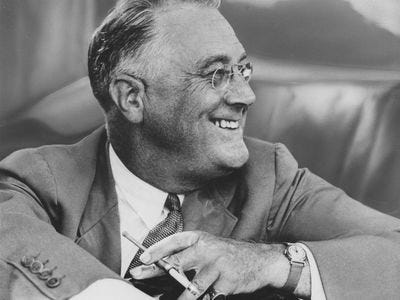Voters are always right
Even when they are wrong
Days before the presidential election of 1936, Franklin Roosevelt capped off his re-election campaign with a rally at Madison Square Garden in New York. Roosevelt recited the accomplishments of his first term, and he said his administration would have done more if not for the bitter resistance of his narrow-minded opponents. "We had to struggle with the old enemies of peace—business and financial monopoly, speculation, reckless banking, class antagonism, sectionalism, war profiteering," he said. "They had begun to consider the government of the United States as a mere appendage to their own affairs. We know now that government by organized money is just as dangerous as government by organized mob."
This was strong language, likening Republican bigwigs to the Mafia. Yet Roosevelt pressed on. "Never before in all our history have these forces been so united against one candidate as they stand today. They are unanimous in their hate for me."
Roosevelt let the image of unanimous loathing hang in the air for a moment. Then he delivered his punch line: "And I welcome their hatred."
Roosevelt's words were as intemperate as stirring political rhetoric often is. Not all the Republican fat cats hated him; some simply despised his policies.
But Roosevelt had chosen his words carefully, and his formulation serves as a model of how to characterize one's political enemies. Roosevelt took pains to make clear he was speaking of a small group of Republican influentials and not of Republican voters generally.
Roosevelt understood a cardinal rule of successful campaigning in a democracy: Never insult ordinary voters, even the most zealous members of the other party. Never blame any substantial portion of the American people for the mistakes of their leaders. In a democracy, the people are always right. Or at least as right as customers are in the capitalist marketplace.
Which is not to say that voters and customers are always right, but merely that they have to be treated as though they are. To cast aspersions on voters' judgment is bad politics, just as questioning customers' tastes or integrity is bad business.
As a practical matter, Roosevelt wanted Republican voters to vote for him. He knew he wouldn't get all of them, or perhaps even very many. But it would be foolish to write them off as a group.
Beyond that, to criticize voters is to insult the premise of democracy: that voters are entitled to their opinions. Such criticism makes the candidate come across as arrogant even to some who agree with him or her.
Hillary Clinton learned this in 2016. In her campaign against Donald Trump, she declared, "You know, to just be grossly generalistic, you could put half of Trump’s supporters into what I call the basket of deplorables. Right?” Clinton grew more specific: “The racist, sexist, homophobic, xenophobic, Islamaphobic—you name it. And unfortunately there are people like that. And he has lifted them up.”
Clinton intended this as a slap against Trump, but it came across as a slur against Republicans. To be sure, she said she was talking about only half the Republicans, but it was easy for the Trump team to argue that this was what she thought about all Republicans. Some Republicans might very well have been inclined to vote for Clinton against Trump, but after this very few did. And in the close race that the 2016 contest turned out to be, her faux pas may have cost her the election.
Mitt Romney erred similarly in 2012. Campaigning against incumbent Barack Obama, Romney said, "There are 47 percent of the people who will vote for the president no matter what. All right, there are 47 percent who are with him, who are dependent upon government, who believe that they are victims, who believe the government has a responsibility to care for them, who believe that they are entitled to health care, to food, to housing, to you-name-it."
Republican consultant Mary Matalin helpfully sharpened Romney’s critique. "There are makers and takers,"Matalin said. "There are producers and there are parasites,"
These comments would have been imprudent under the best of circumstances. But coming as the nation was digging out of the worst recession since World War II, this approach smacked of blaming the victims—to wit, the unemployed victims of a recession resulting from Wall Street’s shady and greedy practices.
The race seemed close when Romney made his remarks. It ended in an easy Obama victory. Romney's tin ear wasn't the sole cause, but it certainly did not help matters.
What Roosevelt knew, Romney and Clinton either never learned or forgot. The fact that two such experienced politicians should commit such a rookie mistake perhaps says less about them than about the times. American politics has never been for the faint-hearted, but we live in an age that carries insult to the extreme. It is more common than not these days for Democrats to disparage all Republicans in the kind of terms Clinton employed. It is standard practice for Republicans to think of all Democrats in the way Romney and Matalin did.
As bad as this is for the chances of candidates seeking election, it is even worse for our chances of being decently governed. Serious politics is the art of the possible and requires compromise, but it is hard to compromise with people you think are evil. And after you have called them evil, your chances of getting them to compromise with you are essentially nil.
Which is another way of saying that politics in America is, for the most part, no longer serious. It has become an arena for signaling tribal solidarity. No wonder the parties have difficulty recruiting serious candidates. Expect more rookie mistakes.


"[P]olitics in America is, for the most part, no longer serious." Truer words have never been spoken.